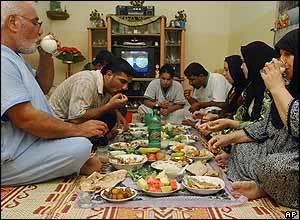Ramadan Message 2008 - Day 2

“You cause the night to gain on the day, and You cause the day to gain on the night; You bring the Living out of the dead, and You bring the dead out of the Living; and You give sustenance to whom You please, without measure.” (Qur'an 3 Verse 27)
DEEN OF EASE: STARTING THE FAST (THE SAHUR)
During Ramadan, the early morning meal before the start of the day’s fast (the Sahur) is an immense benefit as it makes fasting easier. It is not compulsory but highly recommended.
One of the most difficult things for me, is waking up for sahur. When I was living by myself, I used to eat and sleep late, and then not wake up for sahur. But when I am with my whole family for Ramadan, I find that I cannot continue doing that. This is mostly due to my mother, who insists that everyone get up, whether they actually have something to eat or not!
Now after reading MuslimMessage's write-up on sahur, I can understand the reasons why.
The Prophet (peace be upon him) instructed: “Have a meal before you fast, for sahur is blessed.” (Bukhari and Muslim).
However, if one chooses not to have a meal, no blame is attached to him.
The Sahur helps the fasting person to be active and reduces the burden of fasting.
It is a Sunnah of the Rasul. It is very easy to practice this Sunnah because one is allowed to have a full meal or a light snack or even a cup of water. It should not be abandoned.
 Waking up at that time of the morning as a family is a unique experience limited to Ramadan. Aside from this being a reawakening of a tradition of the Prophet, “Allah and His angels pray for those who have sahur.” (Ahmad).
Waking up at that time of the morning as a family is a unique experience limited to Ramadan. Aside from this being a reawakening of a tradition of the Prophet, “Allah and His angels pray for those who have sahur.” (Ahmad).The time for Sahur is anytime from the midnight till the break of dawn. It is however preferable that the sahur is delayed until the point when the dawn breaks. A companion reported that: “We used to take sahur with God’s Messenger before offering our dawn prayers.” He was asked how much time was between the two, and he answered: “As much as it would take to recite fifty verses of the Qur’an.” (Bukhari and Muslim) Also the Prophet and his companions have been described as “…the last to have sahur.” (Bayhaqi). Some of the companions only stop eating their Sahuur when they hear the call to prayer (Adhan).
We are allowed to continue eating when we are in doubt about whether or not the dawn has broken until one is certain. We are discouraged from taking action based on doubts or uncertainty. Allah says: “Eat and drink until you can see the white streak of dawn against the blackness of the night. Then resume the fast till nightfall.” (Qur’an 2 verse 187) A man said to Abdullah ibn Abbas: “I may be having my sahuur when I start having doubts that dawn is due. If this happens, I stop eating.” Ibn Abbas replied: “Eat if you doubt until you are certain.” Even Imam Ahmad ibn Hanbal, ruled that: “If one is unsure whether dawn is due, he goes on eating until he is certain.”
 We should avoid finishing our food long before the Fajr (the Dawn). This is contradictory to the spirit of Ramadan and the Sunnah of the Prophet. Who has instructed: “If one of you hears the call to Prayer and the vessel is in the hand of one of you, then let him not put it down until he fulfils his need from it.” The vessel refers to food or some drink which a person may take as Sahur. Allah desires ease for us and not hardship as He indicated in the verses on Ramadan fast: “Allah desires for you ease; He desires not hardship for you” (Qur’an 2 verse 185)
We should avoid finishing our food long before the Fajr (the Dawn). This is contradictory to the spirit of Ramadan and the Sunnah of the Prophet. Who has instructed: “If one of you hears the call to Prayer and the vessel is in the hand of one of you, then let him not put it down until he fulfils his need from it.” The vessel refers to food or some drink which a person may take as Sahur. Allah desires ease for us and not hardship as He indicated in the verses on Ramadan fast: “Allah desires for you ease; He desires not hardship for you” (Qur’an 2 verse 185)The Prophet (peace be upon him) said, “The Prophet said: “People will continue to be successful as long as they terminate their fast immediately (without) after sunset.” (Bukhari & Muslim).” (Bukhari)
Labels: Ramadan Messages
Share







0 Comments:
Post a Comment
Subscribe to Post Comments [Atom]
<< Home